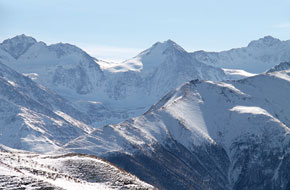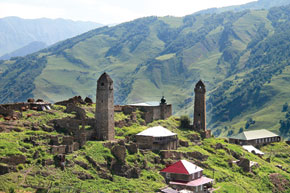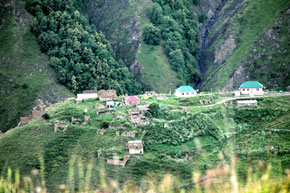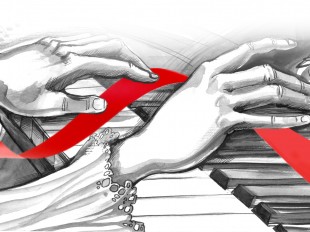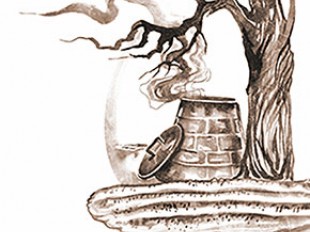We print below Chapter 10 from prize-winning novel Man of the Mountains (ISBN 099304445X) with the kind permission of the author, Zaur Hasanov, translator Caroline Walton, and publisher, Silk Road Media.
Our return was not the only piece of news discussed in every house in the village. Doku had come home for a visit. He had been one of the first boys to leave the village to receive an education abroad and now he had a strange and mysterious aura about him. My mother said Doku's mother was going around praising her son to the skies. - Look how clever he is, studying somewhere abroad.
It meant he would become rich and famous. Everyone believed that foreign lands ran with milk and honey.
We were invited over to see him. An Arab had also arrived with Doku. In the evening I was all ready to leave when I overheard my father complaining to my mother that he didn't want to go to the gathering. My mother insisted, saying it would look very impolite on our part not to turn up.
I don't want to see these foreign mullahs. In two years seven of our young lads have already gone to Arabia to study to be mullahs. What do we need so many mullahs for? During 70 years of Soviet power we didn't manage to produce even ten doctors, teachers or scientists. In the past two years the number of mullahs has surpassed the number of teachers in our school.
My father was agitated, and went on complaining to my mother about the new arrival. I listened for a couple of minutes then went downstairs and outside to meet Emi. Together we walked over to Doku's house. I had no connections with him, either personal or through family. Therefore our paths in the village rarely crossed. What's more, he was older than me by several years. But I was interested in his foreign guest.
Visitors did not often come to our village, so every new arrival was celebrated as an event. Furthermore, I had never seen a person from the countries around the Persian Gulf. That part of the world seemed as distant to me as Mars and Venus. As we approached Doku's house we saw a Niva car parked by the gate. We ran over to it and peered inside. The car was almost brand new.
Hey Zaur, look at that, Emi caught my attention. I followed his gaze.
Wow! I exclaimed.
There was an American cassette player in the car, Pioneer brand. I had heard a lot about them but never seen one. They say they never chewed up tapes and the sound was very clean. It meant that the Arab visitor really was an important person. I even felt proud that such a distinguished guest should grace our humble village.
We went into the house and greeted Doku. We asked where the young people should sit. Usually, the old men and the youths sat separately.
Today we are all sitting together, Doku answered.
How do you mean, all together? I asked in surprise.
The women will sit separately but we will all sit in one room. Al Rashid wants to meet everyone in the village. We decided to depart from our traditions a little, he replied.
I wanted to get to know this mysterious Al Rashid a bit better. On entering the room I had another surprise. It contained a foreign TV set and video recorder. Almost every family in the village had a TV set but a combined TV and video player of foreign make was something from the realms of fantasy. We all gathered around this apparatus, prodding and twiddling various knobs and thinking up interesting explanations for the function of each one of them.
Amazing, I said. You only have to put a cassette in and then watch whatever film you want. It's the equivalent of having your own private cinema.
You don't have to wait at the ticket office to get a ticket, you can choose the movie you want and not have to worry that it will be ruined by poor quality film, Emi added.
He was right. When they brought a new film to the village, basically an Indian movie like Samraata or Zeeta and Geeta, the viewing turned into a real battle with casualties. A ticket queue would form several hours before the showing, the line would get longer until just before the showing and then a great scuffle would break out as everyone fought to get hold of a ticket. Ruslan once broke the cashier's window and cut his hand when the tickets ran out. That wasn't the last misfortune of the evening. Because of the film's poor quality the movie was interrupted in several places, calling forth a shower of abuse at the projectionist.
The realities of our life made me look upon this video recorder as a priceless luxury among a festival of beggars. I started to believe that not only an educated mullah but a very prosperous man had returned to our midst. We were all amazed. Doku's fate seemed like that of the beggar in the fairytale who one day wakes up to find himself a king.
Guests began to fill the room. We young lads gathered together, sitting huddled up in order to leave more room for the aksakkals. But I was seized by a feeling of unease and I sensed that my friends were affected in the same way. Until that point, we had almost never sat in one group together with our elders. Among the mountain people there is an unwritten hierarchy in which a young man must not sit in the company of an older man. In Doku's home we were breaking this tradition for the first time.
My father arrived with the last few guests and by now the room was almost full. Emi and I were chatting about this and that when Al Rashid appeared. He was a man of 30 to 35, of medium height with a long unkempt beard and thick lips. I was impressed by his large eyes which almost never blinked. Uttering the traditional Islamic greeting, Assalam aleikum, and pressing his hand to his heart, he sat down in the seat of honour. An uneasy silence reigned.
Welcome to our land, said Emi's father in Russian.
Al Rashid thanked him in the same language. Just then food was brought into the room. It was a feast fit for a king and we began to eat heartily. Doku sat down beside his guest.
Tell us, what was life like in those far off regions? one of the villagers asked Doku.
Everything went well, Allah be praised. I studied in Medina and I am thinking about serving the Almighty. I was with my friend Al Rashid for all these years and when the time came to return home, he was gracious enough to come here to stay with me for a few days.
What did you study there? asked my father.
Basically, the word of God, the Quran and the Hadiths, and the fundamental principles of other religions.
And more specifically? asked my father with an inexplicable show of interest.
Doku paused for a minute and frowned.
The fundamentals of religion, the word of Allah in the Quran, the origins of man and the questions of suffering and evil, war and peace, jihad, the principles of mutual financial support amongst Muslims and much else.
"Jihad, what is that?" I wondered. I more or less understood everything Doku had said, except for the word jihad which I had never come across. I turned to Emi as our main expert on religious questions. Emi answered that it was a religious war.
And why would we fight for our religion? I asked.
Never in my life had I heard the word jihad. War with foreigners was called qazavat but these wars did not have a particularly religious character. Religion in these parts served to help people face their aggressors, but it did not play a main role. No-one had ever spoken about purely religious warfare.
Every Muslim has a privilege, that of visiting the land of the prophet Mohammed in the place where our religion was born, and a greater privilege is to study there and become a true Muslim. It greatly surprised us that the Arab spoke Russian.
And so in your opinion, we not true Muslims? my father asked.
I felt that my father had something against Al Rashid. His manner was brusque. We normally treat guests with great respect, seating them in the place of honour, offering them the tastiest dishes, but my father was in a hostile mood and I didn't know the reason why.
You live in a country which is ruled by Christian infidels. Even if your infidels adhered to the precepts of the Quran and Hadiths of the prophet, it would not be enough, the Arab guest replied without blinking his eyes. He stared at those around him with the intensity of a hypnotist.
Do you think that none of the people in this room understand that they are ruled by the faithless? Do you think that they are not valorous enough to prevent this, and that this great mission is entrusted to you?
This was too much. Abdulaziz had crossed the boundaries of hospitality. In truth, he had insulted the guest.
It's not your fault. You lived in a totalitarian country. They repressed you, deliberately destroying you and sending you into exile into Kazakhstan.
Yes, and besides us they deported the Ingush, the Crimean Tatars, the Kalmyks, the Karachayevs, the Meskhetian Turks, the Azerbaijanis and many other peoples, my father replied.
You see, these infidels deported all the Muslims, said the Arab. Doku showed his agreement with a nod of the head. The other guests preferred to observe the contest without revealing their own opinions.
It is strange how you take such a hostile attitude towards Christians. As far as I know, you are Saudi Arabian, aren't you?
Al Rashid nodded his assent.
Well, several hundred miles from the holy city of Mecca, the city in which the Prophet Mohammed announced his holy mission, where the holy Kaaba lies, is an American military base. A military base of a Christian country.
Silenced reigned in the room. I hadn't known that fact. My father continued in an even tone.
As for Stalin, he not only exiled Muslims, but Russian Germans and Jews. If he hated only Muslims, he would have exiled only Muslims, so why did he have to deport Christians and Jews? What's more, if you want to insist that Stalin particularly singled out Muslims for repression, why didn't he exile other Muslim peoples of the Caucasus, such as the Lezgis, the Avars, the Dargins and others?
Al Rashid realised that he was dealing with a man who knew his history. He had probably not expected to find such a worthy opponent in this God-forsaken village. I was more astounded than anyone. After each of Al Rashid's rejoinders I doubted that Abdulaziz would find any comeback. For the Arab spoke the truth. We had been ruled by Christians; we had been deported during the Second World War. But my father's arguments disarmed Al Rashid. Under normal circumstances the Arab's reasoning would have been accepted, but it seemed weak today. I think it was at this moment that Al Rashid resorted to his final argument.
Stalin, more than anyone else, knew that it was the Chechens who were most capable of leading an uprising in the Caucasus. Therefore he didn't deport other Islamic peoples. What threat were they to him?
This answer put smiles on the faces of many people sitting around. Our guest had shown that he had no understanding of the Chechens, of our history, or of how we viewed ourselves today.
You evidently have a poor knowledge of the history of these parts. Long ago, when the Russians came to make war here, uprisings against the Russians in Chechnya and the Caucasus were led by the Imam Shamil. He was an Avar by nationality. Allah forbid that you ever come among a gathering where there are both Chechens and Avars and say what you've just said. They won't forgive mistakes like that. But we can leave this subject of Russians and our past and our future. My father paused and then got up and walked calmly to the door. On the threshold he turned to face Al Rashid for the last time.
I doubt that you love us Chechens more than we love ourselves, or care for the purity of our religion more than we do, or wish for more good for our children. Furthermore, "Not a single country shall achieve glory by adopting another country's customs". Having spoken these words he bid us a quiet farewell and left the room. After a minute we followed him. The faces of the Arab and Doku were red as they struggled to conceal their anger.
